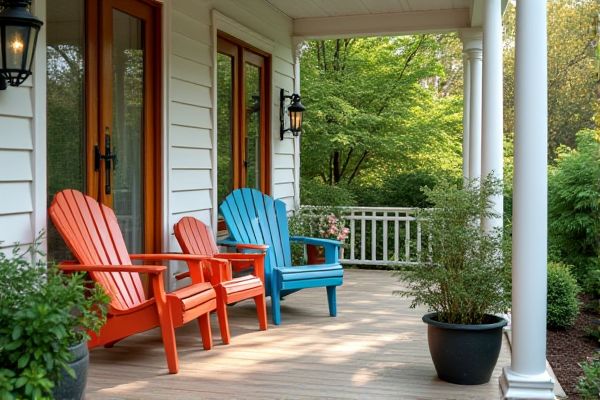
Metal chairs offer superior durability and a sleek, modern aesthetic for your porch, resisting weather wear better than plastic alternatives. Explore the rest of the article to discover which chair type suits your porch needs and style preferences.
Table of Comparison
| Feature | Metal Chairs (Porch) | Plastic Chairs (Porch) |
|---|---|---|
| Durability | Highly durable, resistant to wear | Moderately durable, prone to cracking |
| Weight | Heavier, stable in wind | Lightweight, easy to move |
| Maintenance | Requires occasional rust prevention | Low maintenance, easy to clean |
| Weather Resistance | Good, but may rust if untreated | Excellent, resists rain and sun damage |
| Comfort | Can be less comfortable without cushions | Often ergonomically molded |
| Cost | Usually higher upfront cost | Generally affordable |
| Design Variety | Classic, elegant styles available | Wide variety of colors and shapes |
| Environmental Impact | Recyclable, long-lasting | Less eco-friendly, plastic waste concerns |
Introduction to Porch Seating: Metal vs Plastic Chairs
Metal chairs offer durability, weather resistance, and a sleek aesthetic ideal for porch seating, while plastic chairs provide lightweight, affordable, and easy-to-clean options suitable for frequent rearrangement. Your choice depends on factors like climate exposure, maintenance preferences, and style compatibility with your porch design. Both materials serve practical functions, but metal chairs typically support higher weight and longevity compared to plastic counterparts.
Durability Comparison: Metal Chairs vs Plastic Chairs
Metal chairs offer superior durability for porch use due to their resistance to heavy wear, weather conditions, and structural damage compared to plastic chairs. Your outdoor seating will benefit from metal's robustness against UV rays, moisture, and temperature fluctuations, reducing the need for frequent replacements. While plastic chairs may be lightweight and affordable, they often degrade faster under prolonged exposure to sun and rain, making metal a more long-lasting investment.
Weather Resistance: Which Material Handles the Elements Better?
Metal chairs, especially those made from aluminum or stainless steel with weather-resistant coatings, generally offer superior durability against harsh weather conditions such as rain, snow, and UV exposure. Plastic chairs can be more prone to fading, cracking, and brittleness over time when exposed to direct sunlight and extreme temperatures. Your choice should consider the climate of your location, as metal chairs tend to maintain structural integrity longer under varied weather elements.
Comfort Levels: Metal Chairs Versus Plastic Chairs
Metal chairs for your porch offer durability but often lack the cushioning and flexibility found in plastic chairs, which can provide greater comfort during extended use. Plastic chairs typically contour slightly to body shape, reducing pressure points compared to the rigid structure of metal chairs. Your choice should consider how long you plan to sit, as plastic chairs generally provide a more comfortable experience for prolonged periods.
Design and Aesthetic Appeal for Porch Settings
Metal chairs offer sleek, modern designs with intricate patterns and durable finishes that elevate your porch's aesthetic with a timeless elegance. Plastic chairs provide versatile color options and lightweight construction, allowing for easy customization and vibrant, casual looks ideal for relaxed, informal porch settings. Choosing between metal and plastic chairs depends on whether you prioritize classic sophistication or bright, flexible style for your outdoor space.
Maintenance Requirements: Metal Chairs vs Plastic Alternatives
Metal chairs require regular maintenance to prevent rust and corrosion, especially if exposed to outdoor elements, involving periodic cleaning and application of protective coatings. Plastic chairs offer low-maintenance benefits with their resistance to weather, requiring only occasional washing to keep them looking clean and functional. Choosing between metal and plastic porch chairs depends on balancing durability needs with the desired upkeep level for long-term usability.
Cost Analysis: Investment and Longevity
Metal chairs for porches generally have a higher initial cost compared to plastic chairs but offer superior longevity and durability, often lasting many years without significant wear. Plastic chairs are more affordable upfront but tend to degrade faster due to exposure to sunlight and weather, leading to more frequent replacements. Evaluating total cost of ownership reveals metal chairs as a cost-effective investment over time despite the higher initial expenditure.
Environmental Impact: Sustainability of Metal and Plastic Chairs
Metal chairs often have a higher environmental impact due to energy-intensive production processes and mining for raw materials, but they are more durable and recyclable, reducing long-term waste. Plastic chairs, while lightweight and cheap, typically rely on petroleum-based materials and contribute significantly to landfill pollution when discarded, as they degrade slowly. Choosing metal chairs can enhance your porch's sustainability by supporting reuse and recycling, minimizing environmental harm compared to single-use plastic alternatives.
Safety Considerations for Outdoor Porch Use
Metal chairs for outdoor porches offer superior durability and stability, reducing risks of tipping or breaking under heavy use, but they can become excessively hot in direct sunlight, posing burn hazards. Plastic chairs are lightweight and resist heat retention, making them safer in hot weather, yet they may crack or warp over time, increasing the risk of structural failure and injury. Choosing chairs with non-slip feet and weather-resistant coatings enhances safety by preventing slips and corrosion on porch surfaces exposed to rain and sun.
Final Verdict: Choosing the Best Porch Chair for Your Needs
Metal chairs offer superior durability and weather resistance, making them ideal for long-term outdoor use on your porch. Plastic chairs provide lightweight convenience and affordability but may lack the sturdiness and aesthetic appeal of metal options. Your final choice depends on whether you prioritize longevity and style or ease of maintenance and budget.
 homyna.com
homyna.com